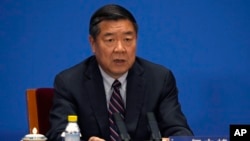He Lifeng, vice premier of the State Council of China, has officially taken up the post of head of the office of the Central Financial Commission and has become the helmsman of the core financial and economic staff of the Communist Party of China.
Although He is described by the outside world as China’s new economic czar, observers say the only economic czar is President Xi Jinping, and He is just the executor of Xi's orders.
He, 68, is a native of Xingning, Guangdong. He first worked on a farm and at a hydropower station in Fujian in 1973 and later attended Xiamen University, completing a doctorate in economics in 1998.
After He entered Xiamen's political arena in 1984, Xi became the deputy mayor of Xiamen in 1985. He was promoted from an office cadre of the Xiamen Municipal Government to deputy mayor of Xiamen from 1992 to 1993, mayor of Quanzhou from 1996 to 1998, and member of the Fujian Provincial Standing Committee from 2001 to 2009.
Since 2009, He served as deputy secretary of the Tianjin Municipal Party Committee and participated in the construction of Binhai New Area, serving as secretary of the Binhai New Area Working Committee for nearly four years. Although the development of the high-end manufacturing park was once bullish, the pile of debts left behind has called into question He's political performance.
Jivan Chien-chun Huang, head of the Mainland China Affairs Division at the Chinese National Federation of Industries in Taipei and an associate professor of international trade at Chinese Cultural University in Taipei, had brief contact with He in Tianjin Binhai New Area.
Huang said Taiwanese businessmen rarely have negative comments about He, but they do not think he is a charismatic politician because his governing style has always been to "follow the leader's lead and make no mistakes."
Huang told VOA that He is different from his predecessor, Liu He, and is not a supporter of free economics or a free-market liberal.
"He Lifeng is more of an implementer of Xi's will. He is less of a free-market policymaker," Huang said. "He used to criticize too much on platform economies and virtual economies, which is more in line with Xi."
Xu Chenggang, a senior research scholar at the Stanford Center on China's Economy and Institutions, said that calling He the "economic czar" is a misunderstanding because He will not be given real decision-making power.
"The only economic czar in China is Xi Jinping, the czar in all aspects," Xu told VOA.
A Chinese economics professor in New York who did not want to be named due to the sensitivity of the issue also said that He has always been a bureaucrat and only implemented the policies handed down by the chief executives since he took office in the Xiamen Municipal Government.
Now, given his association with Xi and that He has been awarded key roles in the central government, the professor said even if He has expertise in economics, he does not have the "guts" to deviate from Xi's line.
Xu said China is deeply trapped in the housing market and local debt problems, and if they are not handled properly, a crisis will bring down the Chinese economy. Xu sees unemployment as China's next major crisis, which will affect the economy and even threaten social stability and the ruling party's authority.
Xu said that under Xi's administration, China's foreign relations have deteriorated across the board, and Sino-U.S. economic and trade relations are particularly difficult to rebuild because Wall Street investors have become wary of China's investment risks. Xu said it may drive more foreign-funded companies to move their manufacturing out of China.
Huang said Xi has called for a balance between security and development since last year. Although Xi repeatedly sought out foreign investment, he also introduced the anti-espionage law, sending a chill through foreign businesses.
Huang said He's policy priorities after taking office would be to stimulate the economy through public investment; to develop the real economy by channeling funds into manufacturing industries such as semiconductors; and to stimulate private consumption.
In an email to VOA, the European Union Chamber of Commerce in China called on He to adopt a "balanced and pragmatic" approach, including "opening the economy further and creating a more welcoming environment for foreign investment."
It also urged him to address challenges such as the economic slowdown, the housing market crisis and local debt.
Ker Gibbs, former president of the American Chamber of Commerce in Shanghai, told VOA that he returned to China for a short stay during the summer and met with many American business friends, most of whom were optimistic and expected He to be a pragmatist.
But Gibbs said that whether He can perform well in his new position depends on whether Xi is willing to release power.
"I think the next six to 18 months is going to be telling in terms of how Xi manages the economy. Will he allow He Lifeng to have a free hand and make decisions? Or will Xi continue to control from the top? It's an open question, but we will see," Gibbs said.
Gibbs also said that Liu had set a good example for He, because Liu's professional performance in recent years has been highly recognized in China's foreign business circles.
"The business community likes to see quiet professionalism from trade negotiators. There was a lot of flame-throwing during the Trump administration, which made everyone uncomfortable. So, it may not be as much of what Liu He did. It is what he didn't do," Gibbs said.




